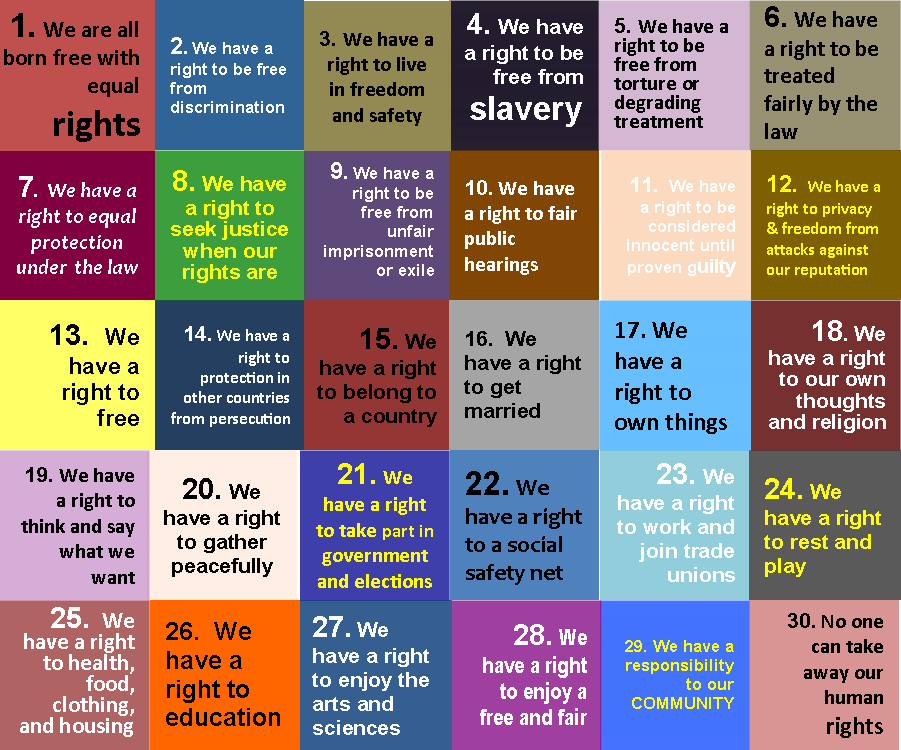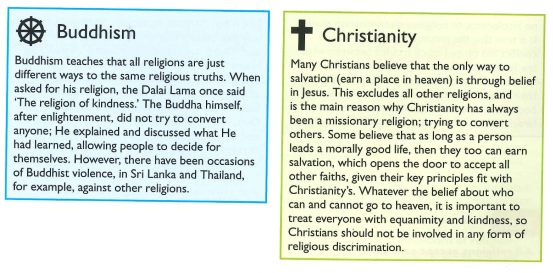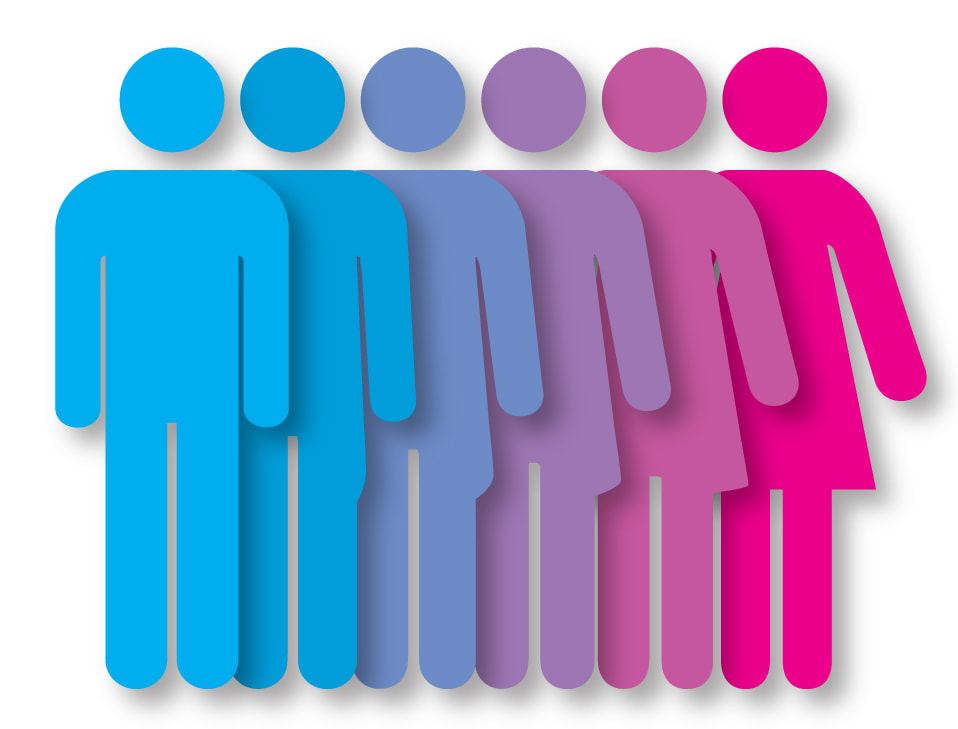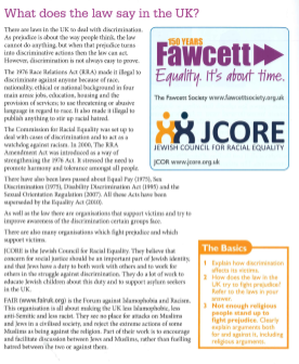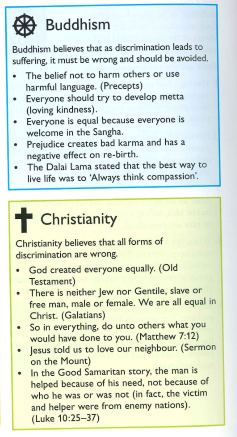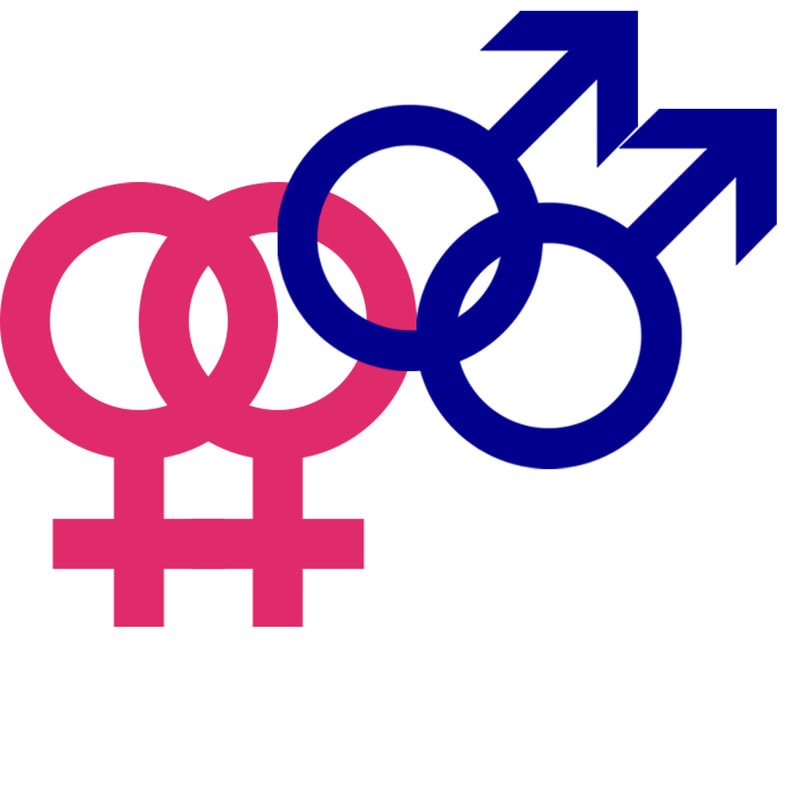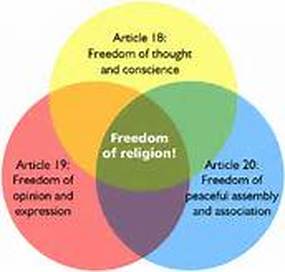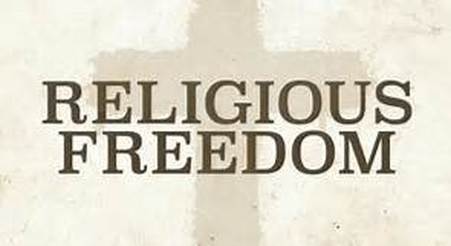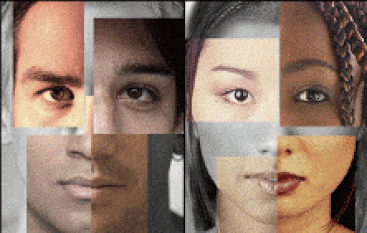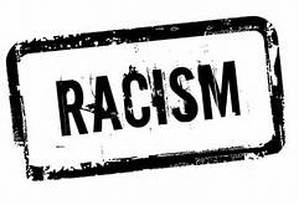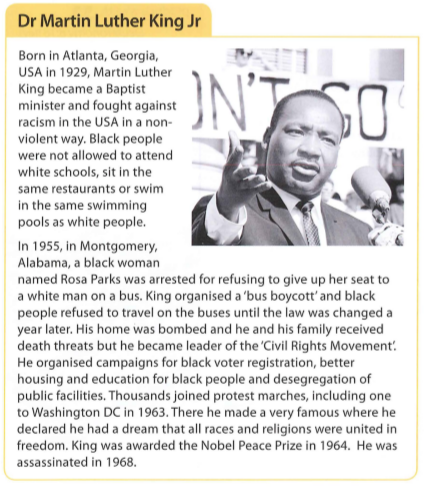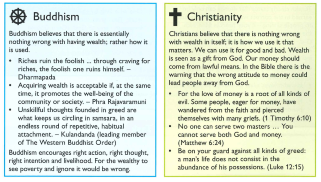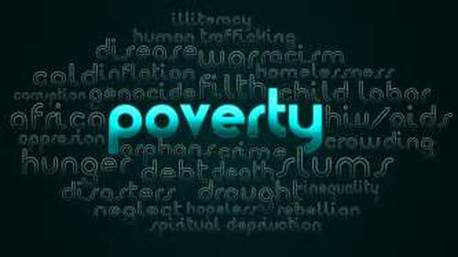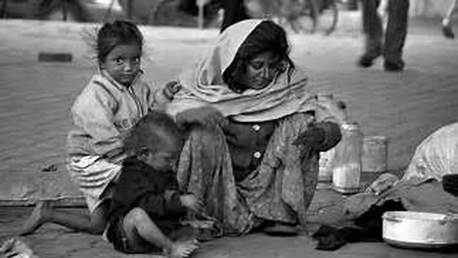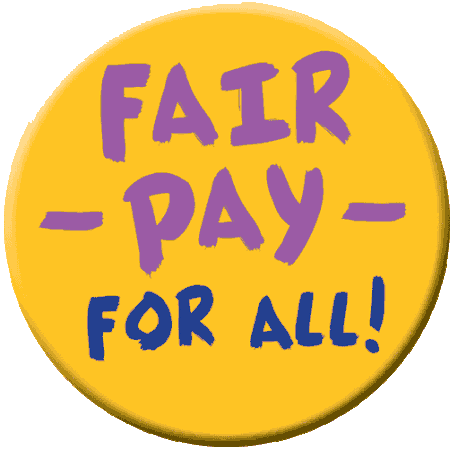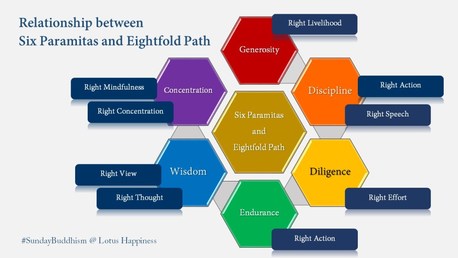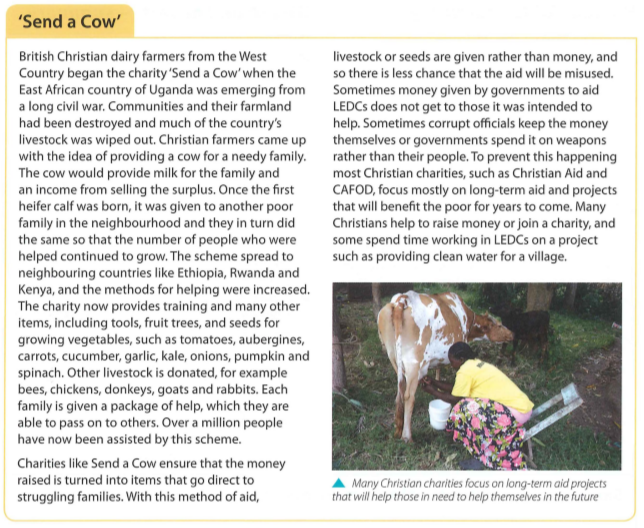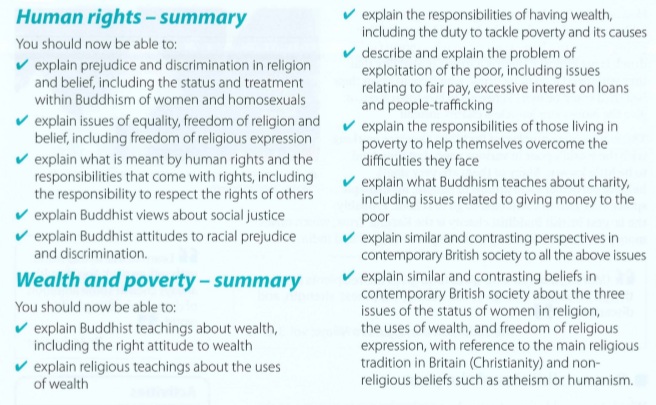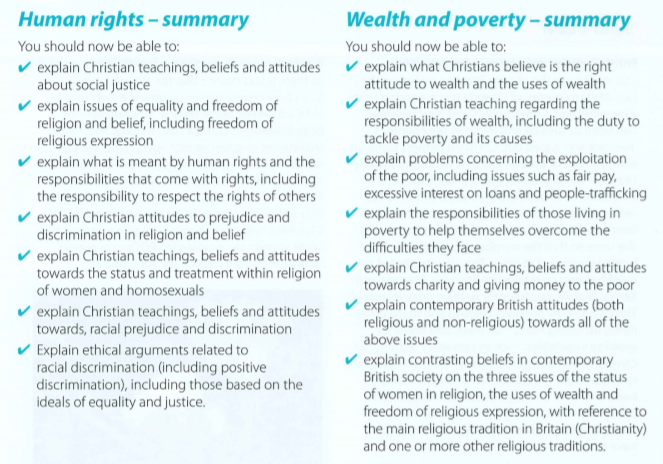|
|
|
Religion, Human Rights and Social Justice.
|
Human Rights: In 1948 the United Nations General Assembly adopted The Universal Declaration of Human Rights (UDHR), which sets out the basic human rights that everyone should be entitled to, regardless of their nationality, language, religion, gender or status. In 30 articles the Declaration sets out what should be the minimum rights or for human beings to enjoy freedom, justice and peace.
The UK passed the Human Rights Act (HRA) in 1998. It includes the rights contained in the European Convention of Human Rights, for example the right to life, liberty, security, privacy, marriage, family life, free elections, education, and a fair trial. It specifies that torture, slavery and forced labour are not allowed. |
Social Justice: exists when people in a society are treated equally under the law, and have equal rights and opportunities. It means that no one is exploited, resources and wealth are shared fairly, and care is taken of the least advantaged members of society.
Many people around the world campaign for greater social justice in their countries. In some countries, people are denied the freedom to follow the religion of their choice or express opinions about the actions of government. Other societies suffer because of a breakdown of law and order, or from violent attacks from terrorists. Some people live in societies where the rich are very rich and the poor struggle to survive. Those who campaign for social justice wish to see a world where people are treated more fairly and given equal opportunities, whatever their gender, sexual orientation, religion, politics, ethnicity, disability or age. |
Lesson One: What are Human Rights?
|
There are many descriptions and declarations of Human Rights. They are what humans should be able to expect as a minimum because they are human. They include basicrights and freedoms, right to life, to not be persecuted by others, to have a fair trial, to free speech, and also the right to have food, shelter, education, healthcare and work.
The UN Declaration of Human Rights starts with the most fundamental statement that "All humans are born free and equal in dignity and rights. They are endowed with reason and conscience and should act towards one another in a spirit of brotherhood." Everything else comes from that. Laws are built on it and our behaviour towards and with others should be governed by it. Rights and responsibilities. People have the right to voice their opinion. But that right brings a responsibility to also listen to the opinions of others, as they also have a right to their opinion. It also brings the responsibility of speaking in a responsible and respectful way, and of taking the consequences of exercising our rights. It is the same for any human right, for example, if i have a right to education, then so do you; if i have a right to good healthcare, then so do you. We cannot say that we do not need to take responsibility for exercising those rights. Sometimes our rights affect others in a negative way, and we have to be mindful of that.
The Human Rights Act 1998 (HRA) gave a legal standing in the UK to the fundamental rights and freedoms contained in the European Convention on Human Rights (ECHR). These are based on the UN declaration. The HRA is supposed to ensure that people's human rights are protected and respected by public authorities. It makes it illegal for public authorities to act against a person's human rights. Everyone in the UK is protected by these rights.
Although, the rights are not absolute. The government has the power to limit or control people's rights under certain conditions, such as in wartime. They also rely on people respectinb each other, and not behaving in a way which would go against other people's rights. Respect is they key to everything because respect for others leads to all those rights.
|
The UN Declaration of Human Rights.
Statements of rights have been written all through history. Britaii's first wasa probably the Magna Carta (1215CE, which state the ruler's commitment to his people. Setting out a code of rights is perhaps the first step in building law and legal systems. The United Nations Declaration of Human Rights was written and then adopted by many countries in 1948, coming about partly because of the atrocities which countries fighting the Second World War had carried out. Although Countries adopt this Declaration, there is no binding requirement for them to keep it. These rights are in two distinct groups: civil and political rights, and, economic, social and cultural rights. The UN claims that these are part of the way to build freedom, peace and justice in the world.
In the UK today, the right to religious freedom is protected, and freedom from persecution because of religion is also possible, because of discrimination laws.
Freedom of religion expression - this is the right of any person to follow the religion of their choice and to be open about what they believe. In the UK, cannot be told (legally) that you are not allowed to follow a particular religion and none are banned. Nor can you be ordered by law to a particular group's interpretation of that religion, so you could not be told that the only legal denomination of Christianity is the Church of England. This was not always the case. For example, in the sixteenth century, first the protestants under Queen Mary and then the Catholics under Queen Elizabeth I, were executed for their beliefs. Freedom from persecution because of religion - this is the right to be legally protected if someone targets you because of the religion you follow. They would have committed a hate crime, which is a criminal offence. So, for example, if a person attacked another person in the street, simply because they thought they were Musli,, then that would be a hate crime. That does not mean that a person who is refused the right to wear a religious symbol whilst at work is a victim of religious discrimination, unless the symbol was compulsory to their religion (like a sikh's turban). All religions will argue for their right to both of these freedoms, But do they also seek to protect the rights of others to their (different) religion? |
Lesson Two: Prejudice and Discrimination
|
Many people consider equality to be hugely important for creating a fair and just world, and for overcoming social injustice. Many Buddhists care deeply about this too, as an expression of their commitment to kindness and relieving suffering. As we have seen, they also believe that people need to accept that life, by its very nature, is ultimately unfair and unsatisfactory. Still, it is important that they do what they can to avoid adding unnecessarily to life's difficulties through their own actions.
Not treating people equally can lead to prejudice and discrimination. Prejudice means thinking less of someone because of their ethnicity, religion, gender, sexual orientation and so on. It is an opinion which has been formed without good reason, knowledge or experience. Prejudice can lead to discrimination, which means treating someone or a group of people differently. Usually this is unfair, and can lead to people feeling worthless, hated and very vulnerable. Christians believe that people are special and precious because, according to Genesis 1:27, they have been created in God's image. People are born into different circumstances but all are equally valuable and can have a relationship with God, 'For God does not show favouritism' (Romans 2:11). Paul in his letter to the Galatians says: '' There is neither Jew nor Gentile, neither slave nor free, nor is there male and female, for you are all one in Christ Jesus. ''Galatians 3:28 [NIV] James warns against prejudice, discrimination and favouritism in James 2: 1-13, summing up his teaching in verse 8 with 'Love your neighbour as yourself.' All these teachings encourage Christians to treat everyone as having equal value. Homosexuality
Adam and Eve were told in Genesis 1:28 to "Be fruitful and increase in number; fill the earth and subdue it" and Genesis 2:24 says, That is why a man leaves his father and mother and is united to his wife, and they will become one flesh.' In the Bible, heterosexual relations are portrayed as natural and what God intended. Much more controversial are homosexual relations. Genesis 19 describes God as destroying Sodom and Gomorrah because of the wickedness and homosexual activity of the inhabitants. Within Christianity there is a diversity of opinion, from condemning homosexual acts as sinful to seeing homosexuality as morally acceptable. Traditionally, the Church has opposed homosexuality with some arguing that God made Adam and Eve male and female and that the prime purpose of sex is for procreation. Other Christians believe that it is not loving to condemn people for their sexual orientation. A central teaching of the Bible is to 'love your neighbour as yourself'. Romans 13:1 says that Christians should submit themselves to the governing authorities. Recently, the law has changed in this country to give equality to everyone, and homosexual couples can now legally get married. Buddhist scriptures say very little about homosexuality. Though some Asian Buddhist teachers, such as the Dalai Lama, have said it is inappropriate for Buddhists to have same-sex relationships, most Buddhists in the West simply think that the moral precepts apply to any couple, whether heterosexual or homosexual. There are no Buddhist teachings that say same-sex relationships are simply wrong, because there is no God who could decide such a thing Buddhist ethics are about noticing and deciding for oneself what actually causes harm. This contrasts for example with the teaching of the Catholic Church, which states that homosexual people should remain celibate. In general, Western Buddhists tend to see same-sex relationships as a normal part of everyday life. There are lots of homosexual British Buddhists, including ordained teachers. Views vary, however. Some Asian Buddhists are less likely to accept same-sex relationships, but this is more a reflection of local culture than Buddhist teaching. |
Gender Prejudice and Discrimination.
While gender discrimination has been illegal in the UK since the Sex Discrimination Act of 1975, it still occurs in a number of different situations. For example, on average women are still paid less than men, and while women make up roughly half the workforce, men hold a higher proportion of senior positions. Paul's letter to the Corinthians appears to show gender prejudice and discrimination against women. He says that just as Christ is the head of man, so a man is the head of a woman. He states that women should wear a head covering in church (1 Corinthians 11:5) and tells the Corinthians that only men should lead worship: '' Women should remain silent in the churches. They are not allowed to speak[ ... ] for it is disgraceful for a woman to speak in the church. '' 7 Corinthians 74:34-35 [NIV]. In some Christian denominations women are not allowed to have important positions. Catholic and Orthodox Churches do not support women becoming priests. They argue that men and women are equal but have different roles. Jesus chose male disciples and the tradition of male leaders since Peter has continued in their churches. In Britain in 1993 the Church of England (Anglican Church) allowed women to be ordained as priests and in 2014 Libby Lane became the first female bishop. Some Anglicans who did not believe this was right joined the Catholic Church as a result of these decisions. Most other denominations have no problem with women being part of the ordained clergy. Some nonconformist denominations have been ordaining women for nearly a hundred years, for example Congregationalists ordained their first woman minister in 1917. Many Christians interpret Paul's letter as applying only to the particular situation in which he was writing. At that time in Corinth, women who did not cover their hair or who pushed themselves into the limelight were regarded as immoral. Moreover, it would have been against the culture of the time for Jesus to have chosen women as his disciples. Women had a domestic or secondary role in society, although some rich women helped to fund Jesus' ministry (Luke 8: 2-3). Today, many would say that it was an age of sexism and society has now change. There is gender discrimination in Buddhism. There are also traditions where women and men are ordained equally. Two examples in Britain are the Triratna Buddhist Order and the Order of Buddhist Contemplatives. Many leading Buddhist teachers in America are women. Positive Discrimination
Discrimination can be positive as well as negative. Positive discrimination is used to promote opportunities for minority groups in society, especially so that those groups are better represented in public services. For example, the Police Service may advertise specifically for black,asian or gay officiers - members of all these groups have an understanding of minority issues. The aim is to create a Polic Force which better reflects and so can better serve our society, both locally and nationally.
|
Lesson Three: Religious Freedom
|
Article 18 of The Universal Declaration of Human Rights says:
'' Everyone has the right to freedom of thought, conscience and religion; this right includes freedom to change his religion or belief, and freedom, either alone or in community with others and in public or private, to manifest his religion or belief in teaching, practice, worship and observance. '' The Universal Declaration of Human Rights In Britain today, the official state religion is Christianity, and the Anglican Church is the established (official) church in England. No one can be forced to join the Church. The government protects freedom of religious expression, that is the right of individuals to worship in whatever way they choose, or not at all, and laws forbid the persecution of members of other faiths or non-believers. Believers are free to evangelise providing that they do not preach hatred and intolerance. Historically, Britain has not always shown such tolerance. During Elizabeth I's reign, the Act of Uniformity meant that people who regularly failed to attend their local church could be fined twelve pence and, if they failed to pay this, they risked having their property confiscated or even being put in prison. Twelve pence is the equivalent of £11 today. A separate Church of England was created by an Act of Parliament in 1534 when Henry VIII wished to break with the Catholic Church. When Henry's daughter, Mary became queen she restored the Catholic faith as the official faith of England. Those who objected to this faced being burned as heretics, and in all 280 people died in this way. On becoming queen, Elizabeth I, who was not a Catholic, broke with the Catholic Church again and those who showed their support for the Pope now risked persecution. During the eighteenth century a number of different churches developed that, although Christian, did not conform to the beliefs of the Church of England. In some places, differing religious views have led to conflict, such as in Northern Ireland. Historically, conflict has arisen from differing religious beliefs, although these have often been the result of a range of other factors too. In the Middle Ages Crusades were organised by Christian kings to recapture the city of Jerusalem from Muslim control. In the twentieth and twenty-first centuries Christians have been persecuted by communist governments and by dictators, for example in North Korea. Christians have also experienced persecution in countries where they are a minority, for example in the Middle East and in Pakistan Christian attitudes to religious freedom.
Christian teaching encourages tolerance and harmony. The gospel writer Mark recorded how the disciples saw a man who did not belong to their group driving out demons in Jesus' name, '"Do not stop him," Jesus said. "For no one who does a miracle in my name can in the next moment say anything bad about me, for whoever is not against us is for us."' (Mark 9:39-40). When Christian denominations fight each other, they are not following what the Bible says. Ephesians 4:2 says, 'Be completely humble and gentle; be patient, bearing with one another in love.' Romans 12:18 says, 'If it is possible, as far as it depends on you, live at peace with everyone.' '' I urge you, brothers and sisters, to watch out for those who cause divisions and put obstacles in your way that are contrary to the teaching you have learned. Keep away from them. '' Romans 7 6:7 7 [NIVJ No religion teaches religious intolerance. Christians believe that Jesus taught religious freedom. The freedom to believe and worship, in public or private, to change religion or not follow any religion is regarded by most Christians as a fundamental human right. |
Buddhist attitude to Religious Freedom.
The Buddha often talked to people who had met other religious teachers with different ideas. Sometimes these people asked the Buddha how they should decide whose teachings to follow. He encouraged them to listen to him and others with respect, and then decide which teachings did, in their own experience, lead to greater happiness and wellbeing. Very few Buddhist traditions try to persuade others that they should become Buddhists. The Buddha's teachings are his description of reality as he saw it, and a series of suggestions for the kind of life which leads to greater happiness and a profound understanding of reality. It is entirely up to the individual whether they wish to follow this. Buddhism teaches that if a Buddhist breaks one of the precepts then nobody will punish them, but they will experience the consequences of their actions, just like anyone else. In Buddhism there is no God to be held accountable to. This means there is quite a lot of freedom within Buddhism to decide how to practise the faith. "I always say that every person on this earth has the freedom to practise or not practise religion. It is all right to do either." Tenzin Gyatso (the Dalai Lama) Religious Freedom in Buddhist countries. In traditionally Buddhist countries in Asia, the culture and law may be strongly influenced by Buddhism, but individuals are free to practise Buddhism with as much or as little commitment as they like. Buddhism is a path of personal transformation, rooted in the wish to end suffering by developing wisdom and compassion, so it is not possible to force someone to be Buddhist. However, there are places in some Buddhist countries where it is not easy to be Hindu or Muslim. In recent years many Buddhists around the world have been shocked by the violence and hatred shown by a small number of Buddhists towards religious or ethnic minorities in countries including Thailand, Myanmar, Sri Lanka and Bhutan. For example, in Myanmar in 2013, there were a series of violent riots and clashes where both Muslims and Buddhists were killed. The reasons for such violence are complex, but are usually rooted in disputes over land, as well as a fear of foreigners. Concerned by the violence, a number of respected Buddhist leaders (including Thich Nhat Hanh) wrote an open letter to their 'brother and sister Buddhists in Myanmar', asking them to remember Buddhist teachings, and to act compassionately towards everyone in Myanmar: '' Buddhist teaching is based on the precepts of refraining from killing and causing harm. Buddhist teaching is based on compassion and mutual care. Buddhist teaching offers respect to all, regardless of class, caste, race or creed. It is only through mutual respect, harmony and tolerance that Myanmar can become a modern great nation benefiting all her people and a shining example to the world. '' |
Lesson Four: Racial prejudice and discrimination.
|
Racism is the belief that the colour of a person's skin, or their race makes a person less valuable than others, so that they can be treated unfairly. We use the word 'racist' to describe someone who discriminates against people of other races in a negative way. The slave trade in the seventeenth and eighteenth centuries was based on the belief that people of colour were somehow less valuable than other people, and so could be bought and sold, and treated in any way, with no rights at all. It cost the lives of tens of thousands and destroyed many communities. This attitude of superiority still exists in the world today. The statistics in the UK show that if you are black, you are most likely to get excluded from school, to achieve less highly than others, to get stopped by the police most often, to get sent to prison, to be murdered.
"All human beings are born free and equal...should act in a spirit of brotherhood...everyone is entitled to all the rights and freedom." Universal Declaration of Human Rights Equality and Justice Religions believe in equality (that we all have the same intrinsic value, and are special beings) and in justice (that things must be made fair, and wrongs made right). So it seems impossible that religious believers could support prejudice of any kind. Prejudice clearly suggests a sense of superiority (not equality) and leads to injustice (not justice). Positive discrimination though can help bring about both as it tries to raise up the life and well-being as well as the profile and status of minority groups. Racism laws In Britain, Acts of Parliament have been passed to make racism illegal, including the Race Relations Act of 1976, the Race Relations (Amendment) Act 2000 and the Equality Act 2010. As a form of unkindness which causes suffering, racism is not in keeping with the Buddha's teaching. Most Buddhists are completely against it and would say they are not racist themselves.
However, Buddhists are imperfect human beings like everyone else. Black and Asian Britons who become Buddhists often feel they don't quite fit in at the Asian temples, where perhaps everything is in Chinese or Sinhala, or follows Thai or Tibetan tradition. They may prefer to attend centres and temples run mostly by white Buddhists, even though they may feel invisible there. The white teachers may unconsciously behave as if everyone is white, always referring to white culture in their teaching, never using readings from black authors, and so on. While there are rarely if ever instances of overt racism in Buddhist centres in the UK, some might argue that more could be done to help minorities feel welcomed. Research |
Christian perspective on racism.
Most Christians today oppose racism in all its forms, although, for example, the Dutch Reformed Church did support apartheid in South Africa during the twentieth century. Paul explained in his letter to the church at Galatia: '' There is neither Jew nor Gentile, neither slave nor free, nor is there male and female, for you are all one in Christ Jesus. '' Galatians 3:28 [NIV] The policy of apartheid in South Africa kept black and white people apart and gave all the privileges to white people. Only white people could vote and black people did not have equal access to education, housing, jobs and other public services. Archbishop Desmond Tutu was one of the leaders who led a peaceful campaign for equal civil rights and the abolition of apartheid, which ended in 1994.
|
Lesson Five: Wealth
|
How do people become wealthy?
Highly paid job, win the lottery, born into wealth, inherited, successful business, talent, (for example, singer or sports person), gambling, crime, investments and savings. What might be seen as fine to some might not to others. If people have worked all their lives we tend to accept this, but are less accepting if thye got their money otherwise. If it seems undeserved, we do not like it, often because we are unsympathetic to that person, for example, a criminal winning the lottery. Even if we accept the way they earned the money we turn to how they use or spend it. If the rich use their money well, for example, give to charity, look after friends and family, and do not flaunt it, then they tend to recieve less criticism. As humans we are great at double standards. We might do the same if we were rich, but because we are not, we are very quick to judge. What does the Bible say?
Old Testament In the Old Testament, God blessed people with wealth in response to their faithfulness to him. God promised that if Israel followed him and obeyed the law he gave Moses, he would bless them: 'The Lord will grant you abundant prosperity' (Deuteronomy 28: 11 [NIV]. For example, King Solomon became an extremely rich king: 'Moreover, I will give you what you have not asked for- both wealth and honour-so that in your lifetime you will have no equal among kings' (1 Kings 3:13 [NIV]. King David also acknowledged that wealth comes from God: 'Wealth and honour come from you; you are the ruler of all things' (1 Chronicles 29:12 [NIV]. However, Deuteronomy 8:18 makes it clear that there was a responsibility to remember it was God who had blessed them. People thanked God by giving a tithe, a tenth of their earnings, as offerings: 'Be sure to set aside a tenth of all that your fields produce each year' (Deuteronomy 14:22 [NIV]; 'A tithe of everything from the land, whether grain from the soil or fruit from the trees, belongs to the Lord; it is holy to the Lord' (Leviticus 27:30 [NIV]. Some Christians today give a tenth of their income to the church. New testament The New Testament focuses on the dangers associated with wealth, greed and selfishness. People can become so involved with money that they forget to love God and forget to love their neighbour. Jesus told a rich young man to sell all he had, give it to the poor and follow him and then he would have treasure in heaven. The young man was unwilling to do that and Jesus said: '' It is easier for a camel to go through the eye of a needle than for someone who is rich to enter the kingdom of God. '' Mark 10:25 [NIV] Jesus was not saying that it is wrong to be wealthy. However, striving for riches brings the danger of people ignoring God, neglecting their spiritual life and even committing crimes. 'Jesus said, "No one can serve two masters [ ... ]You cannot serve both God and money'" (Matthew 6:24 [NIV]. Jesus teaches that people should choose God and, 'seek first his kingdom and his righteousness' (Matthew 6:33 [NIV]. |
How much wealth should a Buddhist have?
Many Buddhists think it is important to earn enough for a simple but dignified life that leaves time to concentrate on spiritual practice. However, there are no restrictions on how much wealth a Buddhist should have, unless, perhaps, they are a monk or nun. There are some rich Buddhists around the world, and some of them use their money to do a great deal of good. For Buddhists, what matters is how people get their money, how they relate to it, and what they do with it. For example, even without committing crime, it is possible to get rich while not paying your workers properly or looking after their health, or from an industry that harms the environment. It is also common for people to rely on being rich for a sense of self-worth, and to use money to gain power over others. Buddhists tend to see such uses of wealth as being unhelpful in developing wisdom and compassion. According to legend, the Buddha grew up in a palace with everything he could possibly want, but abandoned this life of luxury to search for enlightenment. He then tried living as an extreme ascetic. While he eventually gave this up, realising that hunger made it impossible to develop wisdom and compassion, he continued to live very simply all his life. For the Buddha, true happiness did not come from having everything he wanted. Being desperately poor and hungry didn't bring happiness either. The Buddha realised that the important thing was to have enough for one's needs, and if one had more than that, to use every opportunity for generosity. Traditionally, when a man became a monk in the Theravada tradition, he chose to live with just a handful of possessions including a bowl, a robe, a needle and thread (to mend the robe) and a razor (to shave his head and face). Though other monastic Buddhist traditions may not require quite such simplicity, all encourage a letting go of attachmentto material possessions. Buddhists who are not monks or nuns need to be able to earn a livelihood and provide for their family if they have one. Everyone needs clothing, food and shelter. Without them, spiritual life is a luxury. Valuing wealth Buddhism teaches that a person's worth does not depend on how much wealth they have, and that money in itself is not good or bad. Used well, money can do a great deal of good in this world. Craving or greed is one of the three poisons, which the Buddha saw as the main cause of suffering. He advised that true happiness does not come from an accumulation of wealth fuelled by greed and an attachment to material possessions. '' By action, knowledge and Dhamma, by virtue and noble way of life- By these are mortals purified, not by lineage or wealth. '' The Buddha in the Majjhima Nikaya, vol. 3, p. 262 Using wealth The Adiya Sutta lists three main benefits of wealth. It suggests that a person can use their wealth to: 1. provide pleasure and satisfaction for themselves, their family and their friends 2. keep themselves safe 3. make offerings to monks, nuns or the poor. Buddhism does not condemn using wealth for one's own entertainment and enjoyment, as long as it does not also create suffering through attachment and craving. However, Buddhism also places much value on using wealth generously for the benefit of others. Giving to monasteries and to charity is important for many Buddhists. Giving without expecting to receive anything in return is a central part of Buddhist ethics. In Buddhist tradition, someone who put his wealth to good use was Anathapindika, a lay disciple of the Buddha. An extremely wealthy banker, he used his wealth to purchase a park and then build a monastery in it for the Buddha and his followers. He provided daily meals for the monks and their visitors, including the sick and other local people. When he had almost nothing left, he still continued to give what he could to others |
Lesson Six: Poverty
|
The Problem of Poverty
Everyone shares the same basic needs. Without food, we are hungry and eventually starve; we need water to drink and keep clean, and without access to clean water, people catch serious diseases. People need clothing and a place to shelter in order to keep warm and survive. Other needs include health care, education and employment, but not every person has all these things. The United Nations Food and Agriculture Organization estimates that one person in nine suffers from chronic hunger or undernourishmentover 800 million people in the world. Around 100 million are homeless with perhaps one billion lacking adequate shelter or housing. A total of 750 million people lack access to safe water; worldwide an average of over 2000 people die a day because of disease caught from unclean water. Possibly as many as one in four people live in conditions that harm their health, safety, prosperity and opportunities. Most of those who are in extreme poverty live in less economically developed countries (LEDCs). Many of these countries have young populations which are growing. Although there is poverty in Britain as well, welfare benefits help to provide the basic necessities. Causes of Poverty There are many causes of poverty. On a worldwide scale, many poor countries have borrowed money at a high rate of interest to help to pay for health care, education and similar necessities, which has resulted in an ever-growing debt. Many countries, such as former colonies with a lot of mineral wealth, have been exploited when that wealth was taken away from them. Some other countries have had corrupt leaders who have misused their power, sometimes taking lots of money for themselves and ruining their country's economy in the process. Many multinational companies have their products made in LEDCs (Less Economically Developed Countrys) and many women and children work in appalling conditions for little pay. Often governments have spent a lot on arms and war causing devastation and suffering. Some countries are vulnerable to natural disasters, such as droughts and floods that can cause crop failure. In some countries there is massive social inequality, with the rich being extremely wealthy and the poor having very little.In Britain one of the main causes of poverty is unemployment. Not everyone is able to find work or is fit to work, and the unemployed have to rely on benefits from the state. Some people are poor even though they are in work because they are receive low wages, while their rent and other costs of living are high. Some get themselves into debt by unwise spending and use of a credit card. For example, debt may be the result of shopping sprees, gambling or spending a significant proportion of income on items like tobacco or alcohol. Financial mismanagement or a sudden change of circumstances, such as losing a job, may compound the problem, particularly if high rates of interest have to be paid on loans. Failure to make provision for retirement may also cause people to be poor. Helping those in Poverty There are two main ways to help the poor. The first is to give emergency aid to help provide basic necessities such as shelter and food. This type of aid is particularly important after a disaster or crisis such as an earthquake or civil war. It is also important for those who need help to survive in the short term, such as those living on the streets in the UK. Some people argue that this type of help is important for people's immediate survival, and that providing it shows compassion and kindness. Others argue that while this type of short-term aid is important, it does not help to get people out of poverty, and it also makes them reliant upon whoever is giving out the aid. Some people therefore feel it is more important to direct their energies towards solving the root causes of poverty. For example, they might campaign against multinational companies that exploit the poor, or they might donate to charities that provide education for those in poverty. |
Responsibilites of those living in poverty
Who is responsible for poverty: the people who are in poverty, or the social systems that have caused their poverty? Some argue that most people are in poverty through unfortunate circumstances that are a result of how society works, therefore it is society's responsibility to help them. Others think that more responsibility should be placed on the individuals in poverty, either not to get into poverty in the first place, or to make more of an effort to improve their situation. There are many types and causes of poverty. Some poverty is the result of personal irresponsibility (such as gambling and drinking one's money away). Some poverty just happens for reasons completely out of a person's control (such as an earthquake destroying someone's village and livelihood). However, Buddhism teaches that all poverty deserves profound compassion. Relieving poverty requires responsibility on the part of poor people, governments, businesses and the wealthy. Christians encourage the poor to attempt to break out of poverty if they are able. Many try very hard to do so and are simply unable to find work. Others take part in work experience or attend training courses to give themselves additional skills. Some do voluntary work in the community which will give them experience, keep them actively working and provide references. Christians regard it as important to help those who need assistance but Proverbs 23:21 also encourages people to be self-sufficient,'for drunkens and gluttons become poor, and drowsiness clothes them in rags.' Making every effort to improve one's skills and education, obtain a good job and budget carefully can enable many to escape the poverty trap. Christians encourage those who have an addiction or other problem that is the cause of their poverty, such as gambling, to seek help, from a Christian counsellor for example. Here is one example of the poor liberating themselves. India's Dalit people, formerly known as 'untouchables', who are at the bottom oflndia's caste system. Since the 1950s, millions of them have freed themselves from extreme poverty. It is significant that many of them did this partly by changing religion. They converted to various religions but many became Buddhists, following their leader, Dr Ambedkar. He told them to 'educate, agitate and organise' to resist the people and laws keeping them in poverty. However, he also said that one of the most important things they could do to free themselves from poverty was to change their self view, to stop seeing themselves as poor and insignificant, to develop more self-respect, and to take themselves and each other seriously. |
Lesson Seven: Exploitation of the poor.
|
Fair Pay
Many multinational companies pay their workers in LEDCs a tiny wage in order to make large profits for their shareholders. This is particularly true in the agriculture and clothing industries. For example, around 200,000 people work in tea plantations in West Berigal, India, and are paid about £1 a day. This is about half the legal minimum an unskilled worker is supposed to be paid. Former workers sometimes migrate to look for work elsewhere, frequently becoming victims of forced labour. Cheap clothes are made in places that most people would describe as sweatshops, to be sold in countries like the UK. Workers are forced to endure poor working conditions, long hours, low wages and other violations of labour rights. Frequently, in developing countries, labour laws are not enforced. Often located in deteriorating and unsafe buildings in countries like Bangladesh, Cambodia, China, India, Indonesia and Vietnam, employees may work fifteen or sixteen hours a day, seven days a week. An important way to stop exploitation of the poor is to make sure they are paid fairly for the work they do. There are many poor people in the world today who are not paid fair wages. This is often because large international companies pay their workers in developing countries tiny wages in order to make large profits for their shareholders. This practice helps to prevent the poor from escaping poverty, because working long hours for tiny wages means they do not have the time or money to gain an education, and acquire the skills they need to find better-paid work. One example of this type of exploitation in Thailand (a primarily Buddhist country) is in the shrimp-processing industry. Hundreds of thousands of workers are forced to work almost like slaves in the shrimpprocessing factories, being paid very little while working long hours in poor conditions. Sometimes workers' passports or identity cards are confiscated so they cannot find work elsewhere. In the UK, the introduction of the National Minimum Wage Act in 1998 made an important difference to fair pay. This set the lowest amount of money an employer can legally pay a worker per hour in the UK. This law was designed to protect workers at the lowest end of the pay structure from exploitation. Another important initiative has been the Fair Trade movement. This aims to improve working conditions and wages for farmers and workers in developing countries. Many Christians supported this introduction as they believe in a fair day's pay for a fair day's work. Many Buddhists consider it very important to balance profit with ethics. Taking workers' time and energy without paying them a reasonable wage goes against the second Buddhist precept, to avoid taking what has not been freely given. Many Western Buddhists try to avoid buying their clothes from Western companies believed to treat their Asian factory workers very badly. A number of British Buddhist places of worship promote Fair Trade. For example, Taraloka Buddhist Retreat Centre for Women in Shropshire is an official 'Fairtrade Temple'. This means that the centre uses Fair Trade products in its meals as much as possible |
Excessive interest on loans
People with poor credit ratings or bad financial histories are often not allowed to borrow money from mainstream banks or money lenders. Instead they have to borrow money from organisations that charge very high rates of interest on their loans. Interest rate figures are usually given as percentages that show how much extra money a person will owe over the course of a year. For example, an interest rate of 100 per cent means that if a person initially borrows £500, at the end of the year they will owe twice that amount-the original £500 and the interest on the loan, which in this case is 100 per cent, so another £500. Some money lenders in the UK charge interest rates around 3000 or 4000 per cent. They often target low-income families who need short-term loans to help them out until the next payday. If people cannot repay the loans fast enough, the huge interest rates mean they can quickly end up in debt. Like underpaying workers, charging excessive interest is also against the Buddha's second precept, to avoid taking what has not been freely given. Making money by exploiting the poor is a clear example of greed. It is a form of deliberate harm, which means it also goes against the first precept. It causes suffering to the person doing it as well as to the person being exploited. On the other hand, many Buddhists feel it is a person's responsibility not to get into debt if they can help it. Sometimes there is no alternative, but sometimes people borrow just to indulge their craving. One example is compulsive overspending on credit cards. Is someone hungry or in danger of being evicted from their home, or do they just want to buy a more fashionable television? Are they becoming addicted to spending? Debt tends to make people feel bad about themselves. This makes it harder to live the kind and honest life which can lead to enlightenment |
|
People trafficking
Human trafficking is a multi-billion pound industry in which criminals profit from the control and exploitation of others. People wanting to get to a new and more prosperous life often pay people smugglers to get them from poverty stricken countries to developed countries. For example, there are known cases in the media of people from countries in Africa and the Middle East who want to reach EU countries and take enormous risks to do so. If they are economic migrants, rather than refugees or asylum seekers, and they are exploited, they may not dare report the traffickers to the authorities as they fear being returned to their country of origin due to their illegal status. Criminal gangs may force some migrants to work in poor conditions for little pay, or to work as prostitutes. Other victims do not intend to leave their country but are lddnapped and forced to work like slaves, or to work in the sex industry in another country. Some of the world's most serious people-trafficking takes place in countries that are extremely poor, and that also happen to be traditionally Buddhist. It's unclear whether trafficking or slavery in the modern Western sense existed in northern India in the Buddha's time. However, he certainly spoke out against India's caste system, in which some groups of people were considered so inferior that they were forced to live outside their villages, doing only the worst jobs such as cleaning toilets, and were paid almost nothing to do it. |
|
Lesson Eight: Giving to Charity
|
There are times when people require immediate help with basic needs. Emergency aid is needed after a terrible disaster such as an earthquake or flood, and charities often help by offering temporary shelter, supplies of food and water, and emergency health care services.
However, this is not enough to solve the long-term problem of poverty. Charities offering long-term aid aim to provide education, tools and skills to help people get out of poverty themselves. Christians are guided by the key concept of justice. They believe people should be treated fairly, so many Christians buy Fairtrade products. A product can carry a Fairtrade logo if the ingredients in the product have been produced on small-scale farms that meet certain standards related to fair wages, workers' rights and the environment. Christians believe they have been given the responsibility of looking after the world (stewardship) and the poor. They also believe they have a duty to demonstrate compassion because the Bible describes how Jesus taught his followers to show Christian love; to 'love your neighbour as yourself'. In Britain, many Christians are involved in supporting soup kitchens, food banks, and charities that provide help for those in poverty or assist them in finding work. Christians encourage everyone to use their gifts and talents (see Matthew 25:14-30), and try to balance providing help and charity with encouraging people to use their abilities to get themselves out of poverty. They also support campaigns that promote greater equality and a just society, for example the Living Wage campaign . |
Several lists of Buddhist virtues start with dana, or generosity, indicating that this is viewed as a most basic Buddhist virtue. The Buddha talked of various possible motivations for giving, some less generous than others. For example, giving because you want something back from the person goes against Buddhist ethics. The Buddha taught that the best way to give is freely, out of desire for the wellbeing of others.However, for Buddhists it is important to give what is likely to be of genuine help. It could be argued that giving money to a homeless person who appears to be drunk is not ethical if there is a strong probability that they will spend it on more drink, which could harm their health. It could be more generous to buy them food, or give the money to a homeless charity instead.
There are a huge number of Buddhist charities working with the world's poor in various ways, but they tend to be little known. Many of them are very small, helping particular local groups of people, for example sponsoring girls in Cambodia to go to school. Probably the largest British Buddhist charity is the Karuna Trust, which raises money for projects working with the poor in Nepal and India. "Monks], a donor who gives food gives the recipients five things. What five? One gives life, beauty, happiness, strength, and discernment. '' The Buddha in the Anguttara Nikaya, val. 3, p. 42 '' Learn to live in this world with self-respect. You should always cherish some ambition of doing something in this world. '' Dr Ambedkar |
Karuna - The Karuna Trust
© 2015 - 2017 The Karuna Trust | Registered Charity Number: 327461 | Registered Address: The Karuna Trust, 72 Holloway Road, London, N7 8JG
